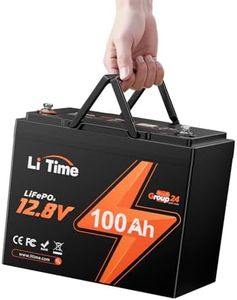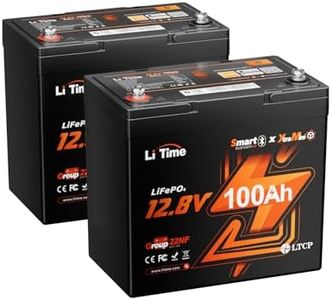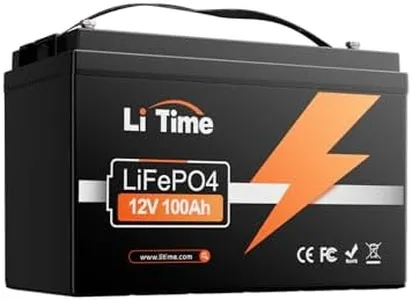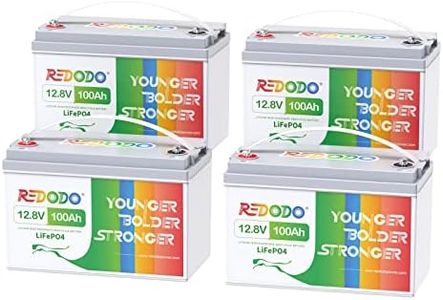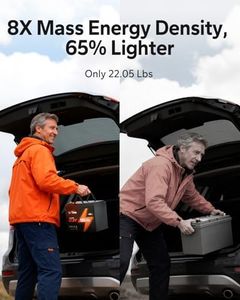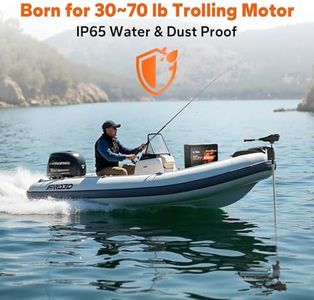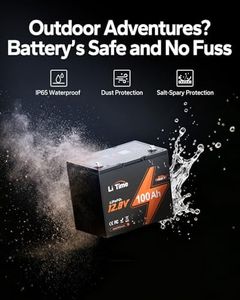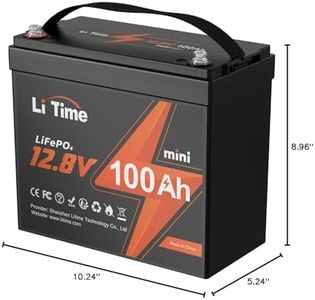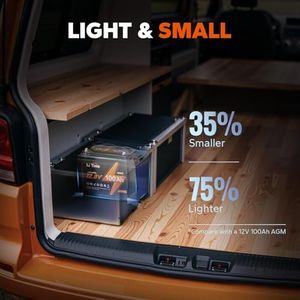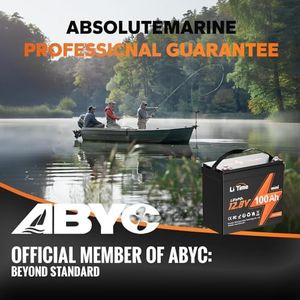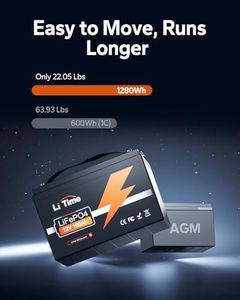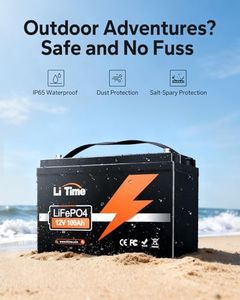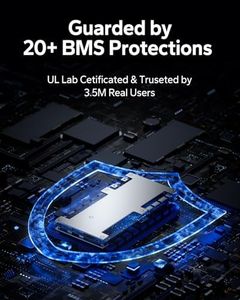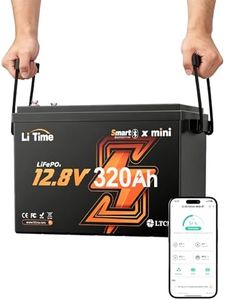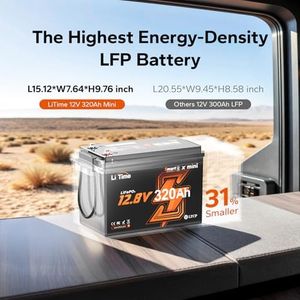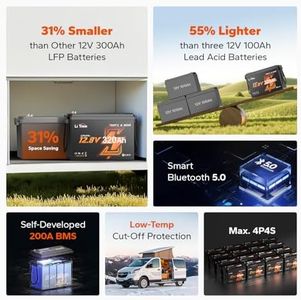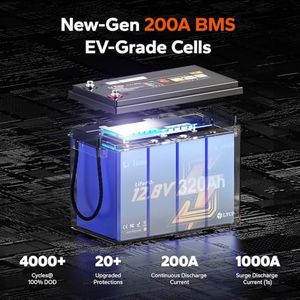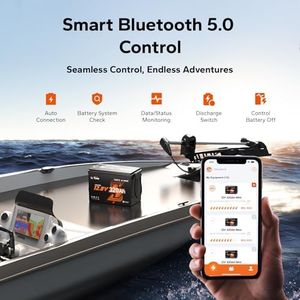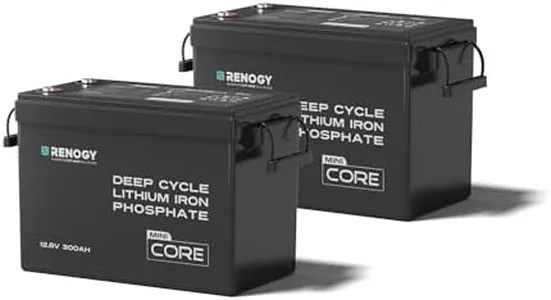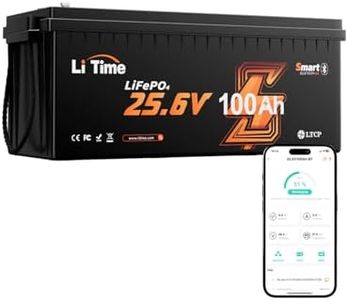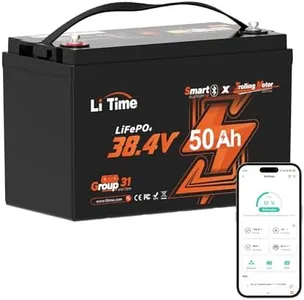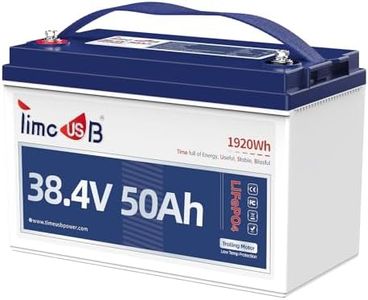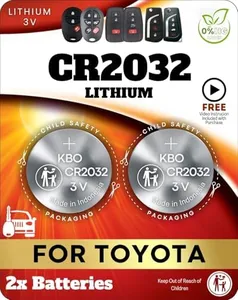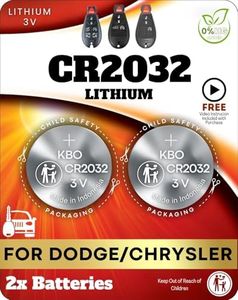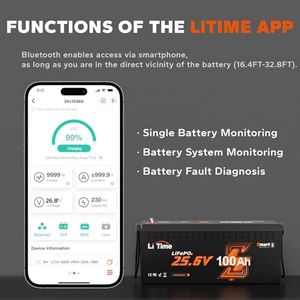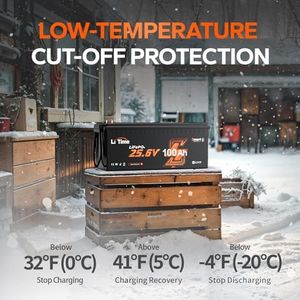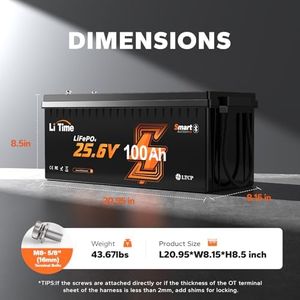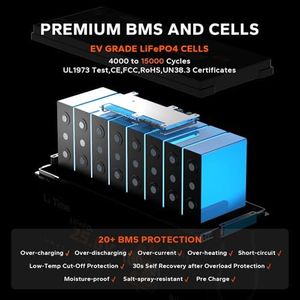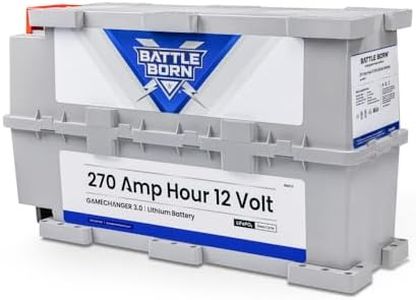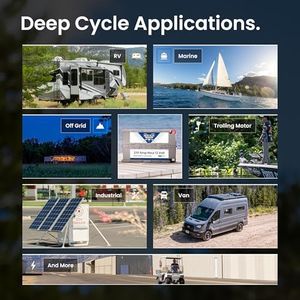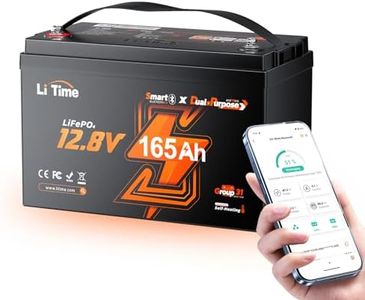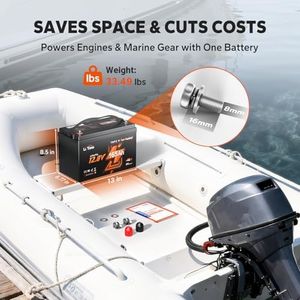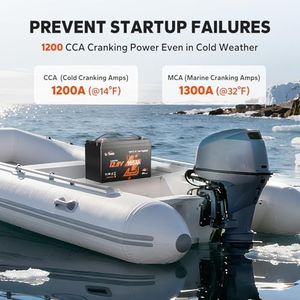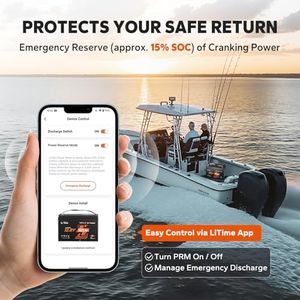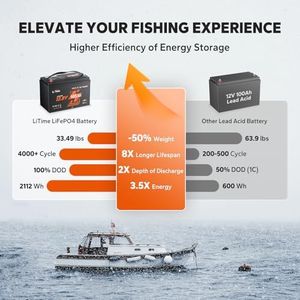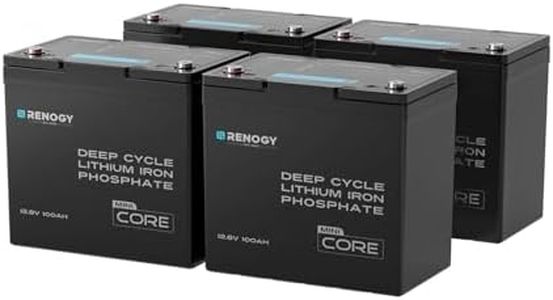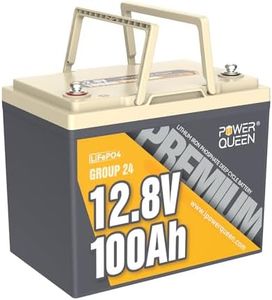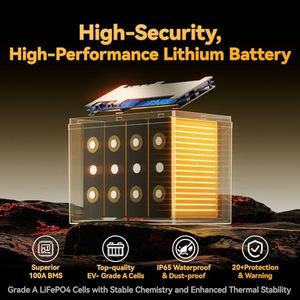10 Best Lithium Battery For Kayak 2026 in the United States
Winner
LiTime 12V 100Ah RV Lithium Battery,Group 24 Rechargeable LiFePO4 Battery with Up to 15000 Cycles, 1.28kWh and Higher Energy Density, Perfect for Trolling Motors, Boat, Marine, Solar etc.
The LiTime 12V 100Ah lithium battery is a solid choice if you need a reliable and lightweight power source for your kayak, especially if you use trolling motors or small marine electronics. Its 100Ah capacity and 12V voltage provide plenty of power, and the battery weighs only 21 pounds, which is about one-third lighter than traditional AGM batteries of similar size. This makes it easier to handle and transport on a kayak.
Most important from
2592 reviews
LiTime 12V 100Ah Xtra-Mini Bluetooth Trolling Motor LiFePO4 Battery, 12 Volt MINI Small Lithium Batteries, Up to 15000 Deep Cycle, 100A BMS for RV, Camper, Travel Trailers, Boat, Yacht, Kayak (2-Pack)
The LiTime 12V 100Ah Xtra-Mini LiFePO4 battery is a compact and lightweight lithium battery well suited for kayakers who need reliable, high-capacity power without bulky equipment. Offering 100 amp-hours at 12 volts, it delivers ample energy (around 1280Wh) to run trolling motors or other small devices on the water. Its small size (about 9 x 5.5 x 8 inches) and relatively light weight (about 19 pounds per battery) make it easy to carry and fit in tight spaces typical on kayaks or small boats.
Most important from
475 reviews
LiTime 12V 100Ah RV Lithium Battery, Group 31 Rechargeable LiFePO4 Battery with Up to 15000 Deep Cycles, 1.28kWh and Higher Energy Density, Perfect for Van, Trolling Motors, Boat, Marine. (1 Pack)
The LiTime 12V 100Ah LiFePO4 battery is a strong choice if you need a lightweight, reliable lithium battery for a kayak or similar outdoor use. It offers a full 12V and a solid 100Ah capacity, enough to power trolling motors or other gear for extended periods. Weighing about 24 pounds, it’s much lighter than traditional lead-acid batteries, which makes it easier to handle and transport during trips. The battery is built with high-quality LiFePO4 cells that provide stable performance and good safety, backed by UL certification and a built-in 100A battery management system to protect against overcharge or discharge. Its size (roughly 13 by 6.8 by 8.4 inches) should fit well in most kayak battery compartments, but it’s always good to check space first.
Most important from
2592 reviews
Top 10 Best Lithium Battery For Kayak 2026 in the United States
Winner
LiTime 12V 100Ah RV Lithium Battery,Group 24 Rechargeable LiFePO4 Battery with Up to 15000 Cycles, 1.28kWh and Higher Energy Density, Perfect for Trolling Motors, Boat, Marine, Solar etc.
LiTime 12V 100Ah RV Lithium Battery,Group 24 Rechargeable LiFePO4 Battery with Up to 15000 Cycles, 1.28kWh and Higher Energy Density, Perfect for Trolling Motors, Boat, Marine, Solar etc.
Chosen by 1267 this week
LiTime 12V 100Ah Xtra-Mini Bluetooth Trolling Motor LiFePO4 Battery, 12 Volt MINI Small Lithium Batteries, Up to 15000 Deep Cycle, 100A BMS for RV, Camper, Travel Trailers, Boat, Yacht, Kayak (2-Pack)
LiTime 12V 100Ah Xtra-Mini Bluetooth Trolling Motor LiFePO4 Battery, 12 Volt MINI Small Lithium Batteries, Up to 15000 Deep Cycle, 100A BMS for RV, Camper, Travel Trailers, Boat, Yacht, Kayak (2-Pack)
LiTime 12V 100Ah RV Lithium Battery, Group 31 Rechargeable LiFePO4 Battery with Up to 15000 Deep Cycles, 1.28kWh and Higher Energy Density, Perfect for Van, Trolling Motors, Boat, Marine. (1 Pack)
LiTime 12V 100Ah RV Lithium Battery, Group 31 Rechargeable LiFePO4 Battery with Up to 15000 Deep Cycles, 1.28kWh and Higher Energy Density, Perfect for Van, Trolling Motors, Boat, Marine. (1 Pack)
LiTime12.8V 320Ah Mini LiFePO4 Battery, 4000+ Deep Cycles Bluetooth Lithium Battery, IP65 Waterproof, Backup Power for RV, Travel Trailer, Trolling Motor
LiTime12.8V 320Ah Mini LiFePO4 Battery, 4000+ Deep Cycles Bluetooth Lithium Battery, IP65 Waterproof, Backup Power for RV, Travel Trailer, Trolling Motor
Renogy 2PCS 12V 300Ah LiFePO4 Lithium Battery Mini Size, 200A BMS with Low-Temperature Cut-Off, Deep Cycle Remote Monitoring, for RV, Cabin, Marine, 600ah LiFePO4 Lithium Battery - Core Series
Renogy 2PCS 12V 300Ah LiFePO4 Lithium Battery Mini Size, 200A BMS with Low-Temperature Cut-Off, Deep Cycle Remote Monitoring, for RV, Cabin, Marine, 600ah LiFePO4 Lithium Battery - Core Series
LiTime 24V 100Ah Bluetooth LiFePO4 Lithium Battery, Low-Temp Cutoff Protection, Built-in 100A BMS, 4000+ Deep Cycles for Trolling Motors, RVs, Marine, Off-Grid, Home Energy
LiTime 24V 100Ah Bluetooth LiFePO4 Lithium Battery, Low-Temp Cutoff Protection, Built-in 100A BMS, 4000+ Deep Cycles for Trolling Motors, RVs, Marine, Off-Grid, Home Energy
270Ah 12V Lithium-Ion (LiFePO4) RV, Van, Marine, Solar, & Off Grid Battery - Internal BMS, High & Low Temperature Protection - Battle Born Batteries
270Ah 12V Lithium-Ion (LiFePO4) RV, Van, Marine, Solar, & Off Grid Battery - Internal BMS, High & Low Temperature Protection - Battle Born Batteries
Litime 12V 165Ah Dual Purpose Lithium Marine Starting & Storage Battery (1200CCA), Group 31 Deep Cycle LiFePO4 Cranking Battery for Boat, Compatiable with Yamaha, Mercury, Honda, Suzuki, Evinrude
Litime 12V 165Ah Dual Purpose Lithium Marine Starting & Storage Battery (1200CCA), Group 31 Deep Cycle LiFePO4 Cranking Battery for Boat, Compatiable with Yamaha, Mercury, Honda, Suzuki, Evinrude
Renogy 4PCS 12V 100Ah LiFePO4 Lithium Battery Mini Size, 100A BMS for Ultimate Safety, Deep Cycle Remote Monitoring, Backup for RV, Cabin, Marine, 400ah LiFePO4 Lithium Battery - Core Series
Renogy 4PCS 12V 100Ah LiFePO4 Lithium Battery Mini Size, 100A BMS for Ultimate Safety, Deep Cycle Remote Monitoring, Backup for RV, Cabin, Marine, 400ah LiFePO4 Lithium Battery - Core Series
Power Queen 12V 100Ah LiFePO4 Battery BCI Group 24 Lithium Battery, Deep Cycle Battery with 100A BMS, 1280Wh, Up to 15000 Cycles & 10-Year Lifespan for Trailer RV, Motor Home, Marine
Power Queen 12V 100Ah LiFePO4 Battery BCI Group 24 Lithium Battery, Deep Cycle Battery with 100A BMS, 1280Wh, Up to 15000 Cycles & 10-Year Lifespan for Trailer RV, Motor Home, Marine
Our technology thoroughly searches through the online shopping world, reviewing hundreds of sites. We then process and analyze this information, updating in real-time to bring you the latest top-rated products. This way, you always get the best and most current options available.

